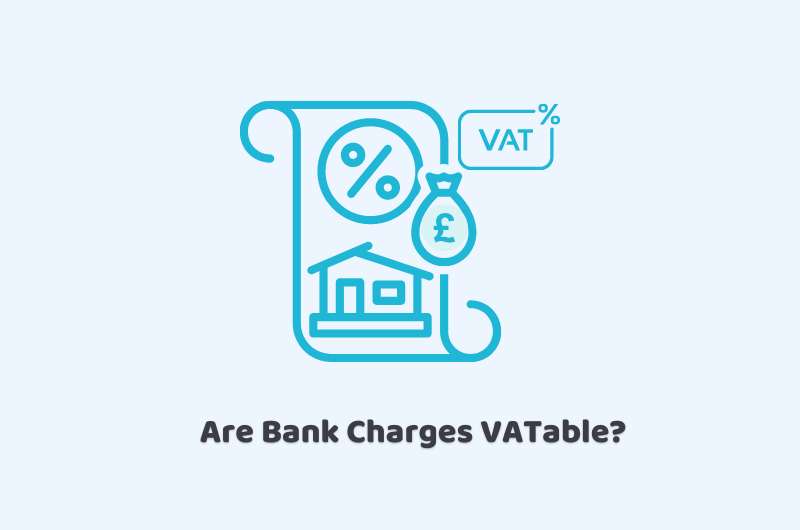
Are Bank Charges VATable?
When managing your business’s finances, it’s essential to understand the tax implications of various costs, including bank charges. A common question many business owners ask is whether bank charges are VATable. In the UK, the answer largely depends on the type of service provided by the bank. This blog will explore when VAT applies to bank charges and help you better understand how these fees affect your business’s tax obligations.
Bank Charges That Are Typically Exempt from VAT
In the UK, most bank charges are exempt from VAT because they fall under the category of financial services, which are generally VAT-exempt. This means that for many of the common banking services your business uses, you won’t have to pay VAT. Some examples of VAT-exempt bank charges include:
- Account maintenance fees: Standard fees charged by banks for maintaining a business account.
- Transaction fees: Fees for typical banking transactions like transfers, deposits, and withdrawals.
- Overdraft charges and interest: Interest or fees charged for using an overdraft facility or for late payments on loans.
- Loan interest: The interest you pay on loans, mortgages, and other forms of financing from your bank.
These charges are part of the everyday banking services your business might use, and they typically do not have VAT applied. For small businesses, this can provide some relief, as you won’t need to worry about reclaiming VAT on these services when completing your VAT return.
Bank Charges That Are Subject to VAT
While most bank charges are VAT-exempt, there are some exceptions where VAT is applicable. These services are usually more specialized and do not fall under the umbrella of general banking services. Some examples include:
- Charges for specific reports or statements: If you request a detailed report or additional copies of statements, the bank may charge VAT on these services, especially if they are considered to be outside the scope of standard banking.
- Financial advisory fees: If your bank provides financial advice or consultation services that go beyond regular banking transactions, VAT may apply to those fees. This could include things like business finance consultancy or investment advice.
- Ancillary banking services: Certain services that are not considered essential to the core banking function, such as document handling or courier fees, may also attract VAT.
- What counts as business travel expenses, and how can the cost be claimed via self-assessment?
- How many years can HMRC go back for self-assessment?
- How does HMRC know I have rental income?
- What do you do if you are new to completing self-assessment tax returns?
- Do HMRC check self-assessment returns?
How to Identify VAT on Bank Charges
When you receive your bank statements or invoices, VATable services should be clearly marked. Banks will usually specify when VAT is being applied to a charge, making it easier for businesses to identify which fees are subject to VAT and which are exempt. This is particularly important if your business is VAT-registered and you want to ensure compliance in your VAT returns.
If VAT is applied to any bank charges, you may be able to reclaim the VAT if the service is used for business purposes. Always review the breakdown of your bank charges carefully to understand your tax position.
How VAT on Bank Charges Affects Your Business
For many businesses, especially small ones, knowing whether bank charges are VATable can have a direct impact on cash flow management and VAT returns. If your business regularly uses specialized banking services that attract VAT, you may need to account for these charges in your VAT calculations.
In cases where VAT is applied, you can usually reclaim it as part of your VAT returns, provided the services were used for the business and are eligible for VAT recovery. However, for exempt services, no VAT is applied, so these won’t affect your VAT return, simplifying the process.

Conclusion
Understanding the VAT treatment of bank charges is vital for keeping your financial records in order and ensuring VAT compliance. Most standard bank charges—such as account maintenance, overdraft fees, and loan interest—are VAT-exempt, meaning they won’t attract VAT. However, for more specialized services, VAT may apply, and it’s important to be aware of these distinctions.
By knowing which charges are VATable and which are not, you can better manage your business’s finances and make sure you reclaim any VAT that’s applicable. Always check your bank’s fee structure and statements to stay on top of your tax obligations, or consult with an accountant for professional advice on managing VAT and other taxes.
If you’re unsure about VAT on bank charges or any other financial matter, it’s worth seeking the guidance of a Chartered Accountant. At CANGAF, we specialize in helping small businesses navigate the complexities of VAT and other tax requirements, ensuring your business remains compliant while optimizing your tax position.


